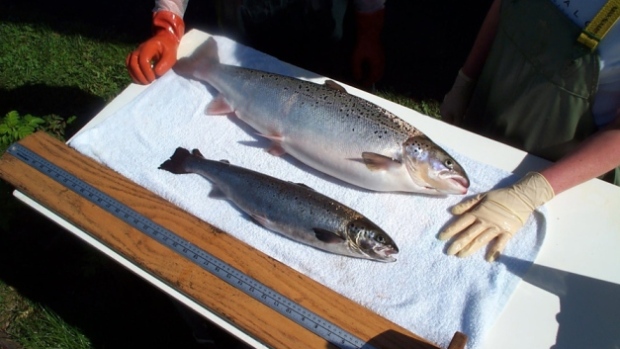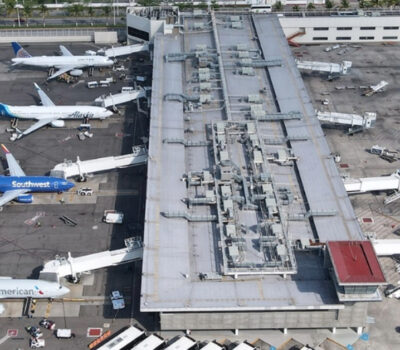The first genetically modified food animal has been approved for sale in Canada.
At a news conference in Ottawa on Thursday, Health Canada and the Canadian Food Inspection Agency announced AquaBounty’s genetically modified salmon has been approved for sale as food in Canada. AquaBounty said it will be at least a year before the salmon will be available in stores.
A final round of thorough and rigorous Canadian scientific reviews found that AquAdvantage Salmon is as safe and nutritious as conventional salmon, according to technical briefing documents provided by Health Canada.
The same conclusion was reached by the U.S. Food and Drug Administration in 2010, but it took until November 2015 for the agency to approve the fish for sale as food in that country. That decision is being challenged by a group of environmental, consumer, and commercial and recreational fishing organizations.
AquAdvantage Salmon was developed by Massachusetts-based AquaBounty Technologies.
The fish grow twice as fast as conventionally farmed Atlantic salmon because of the addition of genes from a Chinook salmon and an eel known as an ocean pout.
“GM foods are becoming more common every day and are part of the regular diets of Canadians. GM foods that have been approved by Health Canada have been consumed in Canada for many years, and are safe and nutritious,” wrote Health Canada.
“Changes to the genes of plants and animals can improve food quality and production — for instance by reducing the need for pesticides, making crops resistant to drought, preventing bruising, or allowing foods to be grown more quickly.”
All genetically modified foods previously approved by Health Canada have been crops.
The Canadian scientific reviews included an investigation by Fisheries and Oceans Canada into the environmental and indirect human health risks associated with AquaBounty’s egg production plant in Bay Fortune, P.E.I.
That assessment, done in 2013, led Environment Canada to approve the genetically modified eggs for commercial production later that year. Those eggs are grown into adult fish at an AquaBounty facility in Panama.
Health Canada will not require AquAdvantage Salmon sold on Canadian grocery store shelves to be labelled as a genetically modified product.
The regulations state that’s only required when there are health risks, like a potential food allergy, or significant changes to the nutritional qualities of the food.
Health Canada said that is not the case with AquAdvantage Salmon.
Agriculture Minister Lawrence MacAulay said he has eaten food made with genetically modified crops before and was emphatic when asked Thursday by reporters if he would eat the salmon.
“Yes I would,” he said. “Science has indicated it’s safe. I’ve eaten all kinds of cereals and stuff and I think I’m doing quite well.”
In a news release, AquaBounty CEO Ronald L. Stotish thanked Canadian scientists “carrying out their assessments diligently” and confirming the safety of the salmon.
“We look forward to bringing our nutritious salmon to consumers to enjoy in an environmentally responsible manner without damaging and exploiting the oceans, with the assurance it is as safe and healthy as the Atlantic salmon they are eating now,” he wrote.
Some environmental groups, such as the Ecology Action Centre based in Halifax, are disappointed with the decision.
The centre is part of two court challenges against the fish — one against FDA approval in the United States, and the other against Environment Canada’s approval of commercial production at the plant in P.E.I. A federal court judge rejected the initial Canadian challenge, but that decision has been appealed.
Mark Butler, the policy co-ordinator at the centre, thought the group had convinced the Trudeau government to use more caution before approving the salmon.
“There is no consultation with Canadians on it,” he said. “It’s just shocking to me and really upsetting. You know, if you wanted to build an addition on your house there would probably be more public consultation than the first GM food animal in the world to hit supermarket shelves in Canada.”
Ruth Salmon, the executive director of the Canadian Aquaculture Industry Alliance, said because labelling is not required, consumers who oppose the genetically modified fish won’t know what they are buying.
“It’s a concern about confusing the consumer, for sure, because I think labelling allows that kind of clarity. So we’ll look at other ways of trying to create that consumer information because that’s important to us.”
She also doesn’t buy the argument by Health Canada and AquaBounty that, with shrinking ocean resources, this type of genetic modification will be needed to help feed the world.
“We have so much going for us in Canada that we haven’t even tapped. I agree feeding the world is critical, but we can do that with the fish that we’re growing in Canada today,” she said.
The first genetically modified food animal has been approved for sale in Canada.
At a news conference in Ottawa on Thursday, Health Canada and the . . .












